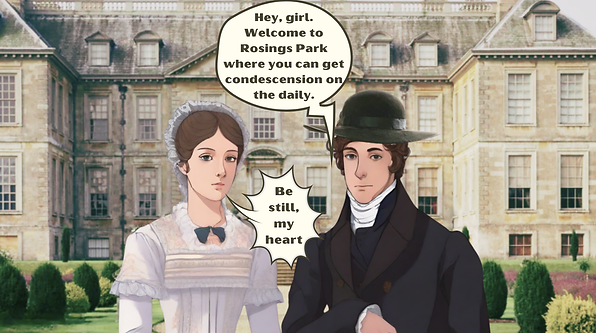The Case of Charlotte Lucas
I am not romantic, you know; I never was. I ask only a comfortable home; and considering Mr. Collins's character, connection, and situation in life, I am convinced that my chance of happiness with him is as fair as most people can boast on entering the marriage state.


- from Pride & Prejudice by Jane Austen

Now, I’m not sayin’ she’s a gold digger, but she ain’t messin’ with no broke vicar. The woman in question is Miss Charlotte Lucas, and the clergyman is Mr. William Collins (likely a rector, not a vicar). And, I think we can all agree that it was the catch of a lifetime. Well, perhaps not. Charlotte Lucas’ closest friend, Elizabeth Bennet, certainly didn’t think so. Having just rejected Mr. Collins herself, after a proposal that never had a chance to elicit anything other than a resounding "thanks, but no thanks", Elizabeth then faced the cries of disbelief from her mother, who thought her daughter’s actions akin to Charlie turning down the chocolate factory. Despite Mrs. Bennet’s protestations, Elizabeth was unwavering, and she must have been convinced that her sensible friend, Charlotte, could not have viewed an offer of marriage from the eccentric clergyman any more favorably than she did. Alas, she was wrong, and not very understanding to Charlotte’s…um, difference of opinion.
Having first read Pride and Prejudice when I was young and had a limited understanding of the world these characters inhabited, I looked upon the idea of marrying Mr. Collins with abhorrence equal to Elizabeth’s own. I see it very differently now, but back then I, like Elizabeth, wondered how any woman of sense and dignity could assent to marry such a man. The following paragraphs discuss the family, financial, and personal situation of Charlotte Lucas. Thereby, considering her options for a happy life, and pondering the question: Should Charlotte have married Mr. Collins?

The Lucases reside at Lucas Lodge, very near Longbourn, and are intimate with the Bennets. In fact, apart from her sister Jane, Charlotte is Elizabeth’s most intimate friend. Their families’ financial situations seem to be similar. Sir William Lucas was a successful tradesman of Meryton, but gave it up after he rose to the honor of knighthood, which may not have been wise considering he had “several” children (likely 6-7). It seems there were at least four female and two male Lucas children, of which Charlotte was the eldest. According to Mrs. Bennet, none of the Lucas girls are handsome. On top of this, it seems there was little money to tempt a suitor.
Knowing that she was neither handsome nor rich, Charlotte is well aware that her chances of a good marriage are growing very bleak. Afterall, she is sensible and intelligent with no romantic delusions. Yet, although she is not one to think highly of men or matrimony, marriage had always been her goal. Why? The reality of Regency England, according to the author, was that marriage “was the only provision for well-educated young women of small fortune”. For the most part, to take paid work meant that a woman would lose her position in society. The only acceptable work a woman of her class could take would be that of governess, and although she did not lose her respectability, she would sacrifice her gentility by taking paid employment.
Apart from this, a woman of talent might become an author…probably anonymously…and probably not quite making enough money to support herself and therefore being dependent on the charity of family. This, our dear Jane Austen would have known well enough by the time she published Pride and Prejudice. Her father was a clergyman of modest means, and after his death she, her sister, and her mother eventually settled at a small house belonging to one of Jane's brothers. The three women relied on a small stipend put together by all of Jane’s brothers for their upkeep. Money was always a worry, and it is unsurprising that economics played a large role in Jane Austen’s stories, The case of Charlotte is not atypical, and it gives us much to consider.

When thinking about the Bennets and the Lucases, it is important to remember that they do not want to marry below the gentry, and the gentry make up a small proportion of the population, making it even more difficult to find a match. The rigidity of the class system and the realities of rank would mean that leaving that sphere of gentility would be a serious downgrade in society. So the acceptable matches came from a very small fraction of the population, and to add to it, the number of eligible men to cross their path was to be even smaller, especially if the Bennets and Lucases rarely left Hertfordshire. It is no wonder that cousins often married, and with that in mind, it is easy to understand how the arrival of the militia would be the cause of great excitement.
Rank was important, but the bottom line was money. To give some idea of numbers, Bingley’s £4,000-5,000 a year would place him in the top one tenth of the the top one percent in regards to wealth. Even Mr. Bennet’s £2,000 would place him in the top one fifth of the top one percent. While the Bennet females feel the strain of their family’s financial situation, they are nowhere near poor, just perhaps among the poorest of the rich. However, if they never marry, they will have no more than £50 per year to support them. It is likely that Charlotte’s situation would be similar. So, the prospect of Mr. Darcy’s £12,000 a year is on the level of fairy tales.
Knowing this, bear with me for a moment and imagine a situation where you seem destined to live out your days out as a financial burden to your family, dependent on their charity. There are multiple younger children for your parents to support. You are twenty-seven, 'past your prime', and have neither money nor looks to recommend you. You have all but given up hope of marriage. Then, a man comes along who has a very good position as a clergyman. Having secured a wealthy patroness and a respectable living, his position gives him the responsibility and right to collect tithes (one tenth of the produce) from his parish to add to his income. He can offer a home that, while small, is well-built, convenient, and nicely situated.
Indeed, it is very nice…for a starter home. Yet, to add to his 'charms', he will eventually inherit an estate of his own. If you marry him, you will someday be the mistress of Longbourn, an estate with a comfortable income and very close to your own family’s home. You might think it is all too good to be true…until you realize that he is a very silly man. He is at the same time exasperatingly pompous while being absurdly obsequious. His understanding is weak, and his propensity to embarrass is strong. However, he is not severe nor a man to be feared. Would you marry him, or would you risk being a dependent spinster?

Elizabeth is more handsome than Charlotte, but the real advantage she has over her friend is time. Elizabeth is twenty, and Charlotte is twenty-seven years old. Your view of the world can change drastically in those seven years. Even within the timeframe of Charlotte’s engagement and Elizabeth’s visit to Hunsford, she begins to see reality differently. At first, so appalled at Charlotte’s decision, Elizabeth believes the friendship is all but broken.
By the time she leaves the parsonage, she looks at Charlotte’s choice with a more philosophical assessment. She even admires Charlotte’s handling of her situation. She is a sensible and energetic housekeeper and makes much of what she has, but the most impressive of her feats is her management of her husband.
However, by no means does Elizabeth envy Charlotte’s choice. Charlotte knows herself and what she would be willing to put up with, but so does Elizabeth, and she knows that such a situation would not work for her temperament. However, she does seem to look on the possible shapes of life and love more flexibly after viewing this salient picture of reality for a woman with little to tempt an acceptable suitor. Elizabeth's pride and prejudices are softened. Yes, Mr. Darcy’s letter was a turning point for Elizabeth, but the experience of seeing her friend’s mature handling of her lot also added to Elizabeth’s growth as a person.
It is much too sad to think that Charlotte gave up the possibility of true happiness, and that she can only hope for contentment at best. I will not toy with you and conjure up a possible scenario where Charlotte falls in love with Mr. Collins over time, growing to cherish his little idiosyncrasies, and he, valuing Charlotte so much, determines to be a better man, more sensible and socially adept. Instead, I end by focusing on what Charlotte managed. She managed her own feelings in order to obtain a home and to have her own family. She managed to have patience and prioritize the positive aspects of her life. She managed her husband, using her sense and shrewdness to minimize his faults. She managed to carve out a space for herself in the world and make the best of her situation. It is impressive, but I don’t envy her for a moment.
Sources:
MOE, M. (2016). CHARLOTTE AND ELIZABETH: MULTIPLE MODERNITIES IN JANE AUSTEN’S “PRIDE AND PREJUDICE.” ELH, 83(4), 1075–1103. http://www.jstor.org/stable/26173905
Magee, W. H. (1987). Instrument of Growth: The Courtship and Marriage Plot in Jane Austen’s Novels. The Journal of Narrative Technique, 17(2), 198–208. http://www.jstor.org/stable/30225182
Robinson, Lillian S. “Why Marry Mr. Collins?” Sex, Class and Culture. 1st ed. Routledge, 1986. 178–199. Web.
Hall, Lynda A. “Sense and Settling.” Women and “Value” in Jane Austen’s Novels. Switzerland: Springer International Publishing AG, 2017. 67–113. Web.
Tandon, B. (2013). The Historical Background. In J. Todd (Ed.), The Cambridge Companion to 'Pride and Prejudice', Cambridge (pp. 67-78). Cambridge University Press.
Page, J. W. (2013). Estates. In J. Todd (Ed.), The Cambridge Companion to 'Pride and Prejudice', Cambridge (pp. 97-108). Cambridge University Press.
HUME, ROBERT D. “MONEY IN JANE AUSTEN.” The Review of English Studies, vol. 64, no. 264, 2013, pp. 289–310. JSTOR, http://www.jstor.org/stable/42003625. Accessed 28 Feb. 2025.
Drum, Alice. “Pride and Prestige: Jane Austen and the Professions.” College Literature, vol. 36, no. 3, 2009, pp. 92–115. JSTOR, http://www.jstor.org/stable/20642039. Accessed 28 Feb. 2025.
Stobart, J. (2025). Life in the Georgian Parsonage: Morals, Material Goods and the English Clergy. United Kingdom: Bloomsbury Academic.


